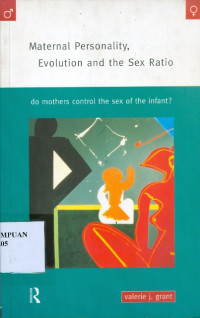
Text
Maternal personality, evolution and the sex ratio: do mothers control the sex of the infant?
This examines the hypothesis that it is a feature of the mother's personality-how dominant she is-that influences which sex will be conceived. The writer examines evidence about maternal personality, gathered from human and animal studies, to show that female testoterone levels could bplay an important role in conceiving male offspring. Women who are dominant are more likely to have sons. Demographic studies show that more male children are born after wars, yet most people believe that their baby's sex is a matter of chance - determined by the father's sperm. Valerie Grant presents evidence that the mother's personality - which is related to female testosterone levels - can actually influence which type of sperm fertilises the egg. Using data from human and animal studies Valerie Grant discusses the implications for human evolution, developmental psychology and reproductive biology. Her claims are controversial and the implications of her findings far reaching. Whether mothers have sons or daughters may not be a matter of chance. It may depend on which sex infant the mother is more suited to raise.
Availability
| KP.VIII.1.000034 | KP.VIII.1 GRA m | My Library | Available |
Detail Information
- Series Title
-
-
- Call Number
-
KP.VIII.1 GRA m
- Publisher
- London : Routledge., 1998
- Collation
-
vii, 222 hal; 21 cm
- Language
-
English
- ISBN/ISSN
-
041515880x
- Classification
-
KP.VIII.1
- Content Type
-
-
- Media Type
-
-
- Carrier Type
-
-
- Edition
-
-
- Subject(s)
- Specific Detail Info
-
-
- Statement of Responsibility
-
-
Other version/related
No other version available
File Attachment
Comments
You must be logged in to post a comment
 Computer Science, Information & General Works
Computer Science, Information & General Works  Philosophy & Psychology
Philosophy & Psychology  Religion
Religion  Social Sciences
Social Sciences  Language
Language  Pure Science
Pure Science  Applied Sciences
Applied Sciences  Art & Recreation
Art & Recreation  Literature
Literature  History & Geography
History & Geography